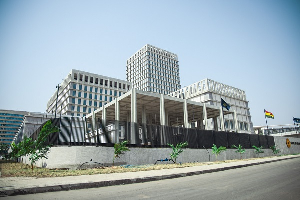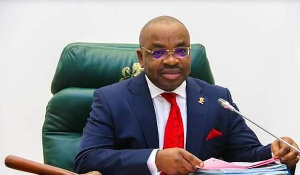Accra, Nov.17, GNA - Steps has been taken by government to increase access to funding to provide and expand infrastructure of the Ghana Institute of Journalism (GIJ), Education, Science and Sport Minister, Professor Dominic Fobih, said on Saturday.
Speaking at the seventh matriculation of the institute in Accra, he noted that, GIJ was now recognised by the ministry and would therefore benefit from the infrastructural development scheme for tertiary institutions.
A total number of 300 fresh students admitted to pursue communication studies at the Diploma and Degree levels swore the matriculation oath to, among other things seek the truth, study diligently and observe the regulation of the University of Ghana and the GIJ. Under the scheme, the institution, he said would be provided with essential facilities like libraries, lecture halls, cafeteria as well as residential accommodation for lecturers adding that the 2008 budget and the GETFUND would cater for it.
To the students, he said; "Given the critical role and challenging roles that your chosen profession entails, you are expected to grab this opportunity and be meticulous in your research, professional in your outlook and be very open minded. In a speech read on his behalf, Professor Clifford Tagoe, Vice Chancellor, University of Ghana said the GIJ as an affiliate of the University has upgraded its programmes from Diploma to Degree level in order to raise the standard of communication practitioners in the country since 2000.
The speech, read by Prof. Kwami Karikari also of the University, said the university would therefore continue to provide the necessary support to ensure that high academic standards are maintained and added that both Degree and Diploma programmes have been evaluated by the National Accreditation Board and appropriate accreditation given. He observed that the nation cannot afford to ignore the role of communication in good governance and industrial peace owing to the enormous power and responsibility of the media and said that the role required a rigorous training in all aspect of the communication profession to ensure that practitioners do not abuse or misuse the power for their parochial interests.
The institute, he said carried an enviable but onerous task of training practitioners for the media to be sensitive to the needs and effects of communication on consolidating democracy. Mr. Kwame Dartey, Executive Secretary of the National Accreditation Board (NAB) noted that with the proliferation of Journalism training institutions in the country there was the need for potential students and guardians to go to the NAB Website - www.nab.gov.gh to check accredited institutions because very few of them were known to the board.
He also appealed that people should report these shadow institutions to NAB and cautioned that the new law Act 744 has not only defined unambiguously what a tertiary institution is, but has also specified offences and penalties that await all unaccredited tertiary institutions and programmes- private or public.
Mr. Kwaku Rockson, Acting Rector of the Institute said acquiring a tertiary status in September 2006 has experience dramatic improvement in various areas which has strengthened its ability to function as the foremost tertiary communication institution not only in Ghana but Africa.
He noted that out of 1500 applicants only 300 were admitted due to space control and expressed the hope that with support of the GEFUND the new site at Okponglo would be completed within the shortest possible time to enable the institute enrol more students. Academic materials in terms of books and journals have been purchased for the library which would be delivered soon, adding that, it also has an internet caf=E9 for both students and staff for information gathering and other academic purposes.
He announced that the institute was working towards the publication of its journal of communication which will initially be a bi-annual peer-reviewed publication and serve as an academic reference source for professional and scholars around the globe and called for articles and research papers. He urged students to play their roles well in their chosen professions by exhibiting a high sense of commitment and discipline.
General News of Saturday, 17 November 2007
Source: GNA
















